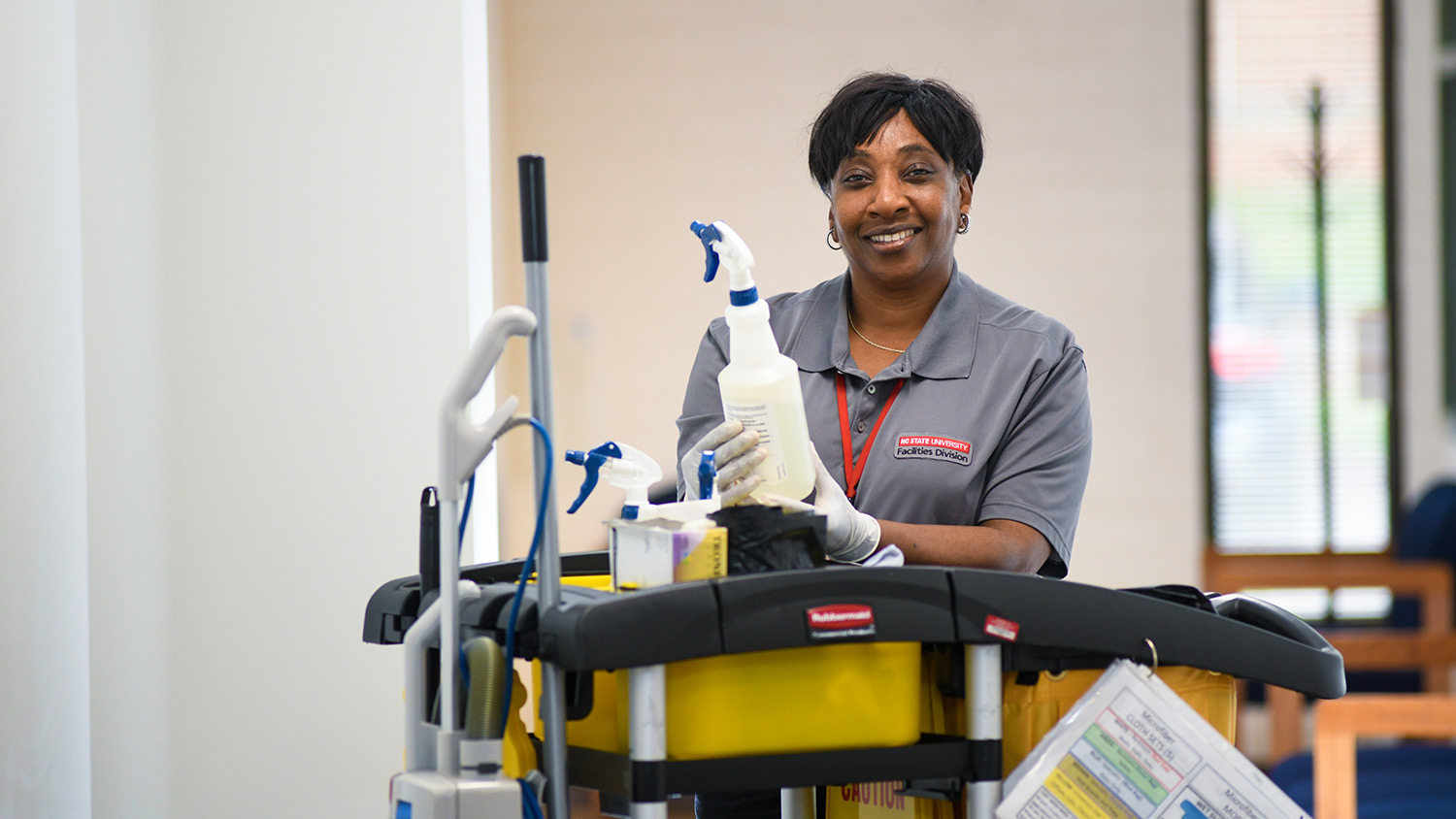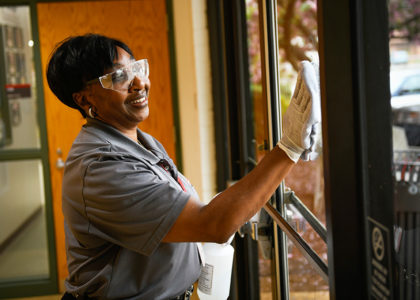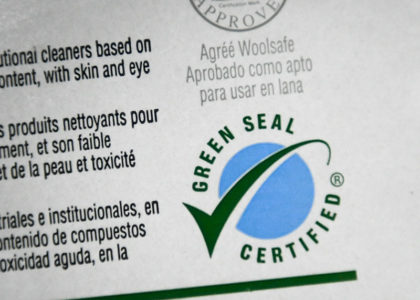NC State Is First University in N.C. To Earn Green Seal Certification

University Housekeeping has received national certification for cleaning services that are safe for people and the environment.
NC State is the first university in North Carolina and the sixth in the United States to earn the rigorous certification from Green Seal, a Washington, D.C.-based nonprofit that verifies the sustainability of products and services.
To earn the certification, University Housekeeping met stringent requirements and passed an extensive performance review encompassing all aspects of its cleaning program. All requirements, which range from equipment and procedures to chemicals and employee training, were rigorously documented and verified through an on-site audit.
“Green Seal Certification affirms our dedication to sustainability and the health of our employees and the campus community,” said Ada Baldwin, director of University Housekeeping. “I could not be more proud of the entire University Housekeeping team for this accomplishment.”
Why Go Green?
Green cleaning has a number of benefits to the NC State community, including better indoor air quality and less human exposure to harsh chemicals. Plus, University Housekeeping has experienced reductions in operational costs, water use and landfill waste.
“We’re looking out for the health of our employees, customers and the environment,” said Hezekiah Henry, a manager with University Housekeeping.
NC State began its shift toward green cleaning more than a decade ago as increased awareness of environmental and human health prompted many manufacturers to develop eco-friendly options.

First, University Housekeeping tried a chemical-free cleaning solution made of ionized water and salt. Not only did it work on campus, but it saved money and was safer for building occupants and housekeeping employees.
With that success, NC State continued pilot projects that led to campuswide adoption of microfiber scrubbers instead of mops and buckets, vacuums with HEPA filtration for improved indoor air quality and touchless bathroom disinfection systems. Housekeeping also found safe, effective alternatives to aerosols and harsh chemicals.
“What makes us stand out is that we adopted these products early and saw benefits early,” Henry said. “We were very progressive in making our products and processes better.”
Protecting Health
University Housekeeping has demonstrated that environmentally-friendly products and processes also benefit human health.
The water-saving microfiber mops used on campus are also ergonomically-friendly and more effective at trapping dust and pollutants. The use of healthier chemicals on campus mean fewer odors and allergic reactions. The HEPA filtration vacuums used on campus make less noise, which prevents long-term hearing loss in employees.
“Our industry is much more concerned with employee health than it was before,” said Taft Waldon, a deputy assistant director with University Housekeeping. “With our green cleaning program, our employees have less chronic illness and ergonomic problems.”
In addition to health, Green Seal certification also accounts for safety. All cleaning supplies are properly labeled, heavy objects aren’t stored overhead in cleaning supply closets, and safety data sheets (SDS) are available in every building. Plus, every housekeeper on campus is extensively trained in the green cleaning process.
“Our staff have to know the reasoning behind our process and the difference between cleaning and green cleaning. There’s a lot that goes into that, and this certification process has given our staff greater pride in what they do,” said Tony Brown, a manager with University Housekeeping.
What’s Next

Maintaining Green Seal certification requires annual evaluation to ensure University Housekeeping’s cleaning products, processes and employee training comply with ever-improving sustainability requirements.
“Green Seal examines absolutely everything you do. They verify every chemical, every piece of equipment, your cleaning process, your training program. They leave no stone unturned,” said Vincent Taylor, a deputy assistant director with University Housekeeping.
As a result of the certification audit, two campus buildings – CBC Facilities Services Center and Lakeview Hall – are also Green Seal certified. Housekeeping hopes to certify additional campus buildings during future annual audits.
“We are very proud of this process. It was rigorous and comprehensive and helped us standardize our cleaning program in every building,” Taylor said. “This certification shows our commitment to sustainability and helps us become a leader.”
How It Works
University Housekeeping’s sustainable cleaning program includes:
Microfiber mops reduce water use by up to 95%. They also reduce cross-contamination and are more effective than traditional mops and buckets. Housekeeping added a small laundry facility in Polk Hall so that microfiber cloths and mop pads can be cleaned cost-effectively and with sustainable soaps.
Dispensing stations pre-measure chemicals to save water, reduce employee exposure to chemicals and ensure proper dilution.
Floor mats at the entrance of buildings reduce the amount of soil and pollutants entering buildings.
Green Seal certified cleaning chemicals and hand soap protect indoor air quality and reduce chemical exposure.
Vacuums have HEPA filters for superior indoor air quality and reduced noise levels, and they are more ergonomically correct.
A water-based cleaning system allows housekeepers to clean most campus surfaces with technology that converts water, electricity and a small amount of salt into an effective cleaning solution. This reduces the amount of packaged chemicals shipped to, stored and used on campus.
Once a single-use item, floor waxing pads can now be regenerated for reuse up to 8 times, saving money and reducing waste.
Floor scrubbers that use and convert water into an effective cleaning solution, which reduces the use of chemicals.